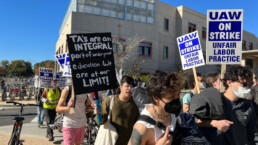If McDonald’s is a real estate company that sells hamburgers, the U.C. system is a real estate company that sells degrees. Grad students are striking not least so they can afford to live where they work.
by Tracy Rosenthal, The New Republic
The University of California—a system of higher education encompassing 10 campuses, 280,000 students, 230,000 faculty and staff, and an operating budget greater than that of 25 states—has offered several reasons why graduate student workers deserve to be underpaid. The jobs are apprenticeships; hardship will be retroactively remedied by future employment. The jobs are part-time, meant to complement workers’ role as students. But as prospects in higher education constrict, graduates face more contingent and contract work. Part-time pay means workers must fill the gap with generational wealth or by decades of servicing debt. On a school schedule, academic workers get nine paychecks a year. The rent, of course, is due in all 12.

According to internal research done by their union, UAW 2865, half of grad workers in the U.C. system pay half their incomes in rent. Ninety-two percent are “rent-burdened,” meaning their landlords claim more than 30 percent of their pay. While U.C. President Michael Drake enjoys a $6.5 million six-bedroom in Berkeley paid for by the state, grad workers sleep on couches, in cars, or in shelters. They pile into overcrowded housing or commute from hours away. On November 15, 19,000 graduate students joined three other UAW organizing efforts, representing postdocs, student researchers, and academic researchers, to inaugurate a strike of 48,000 people—the largest strike of academic workers in U.S. history. “Either you’re striking for yourself because that’s the position you’ve been put in, or you’re striking for your comrades, your classmates, your departmentmates,” Magally A. Miranda Alcázar, a striking teaching assistant in Chicano Studies at the University of California, Los Angeles, told me.
There’s more to the academic workers’ struggle than salaries. At stake is the privatization project that has for decades entangled the public university with for-profit enterprise, particularly in real estate. As the strike’s focus on rent burdens and its initial demand of a cost-of-living adjustment make clear, workers are not just fighting for what they live on, but against an institution that constrains where and how they live.
Recent Posts
How to Organize Safely in the Age of Surveillance
February 22, 2026
Take Action Now From threat modeling to encrypted collaboration apps, we’ve collected experts’ tips and tools for safely and effectively building a…
‘The Siege Must Be Broken’: Countries Called to Ship Fuel to Cuba After Trump Tariffs Struck Down
February 21, 2026
Take Action Now The US Supreme Court’s ruling “implies that Trump’s recent order imposing tariffs on countries selling oil to Cuba exceeds the…
Elite Depravity in Imperial Decline, A Zero Hour Conversation With Richard Wolff
February 20, 2026
Take Action Now “The system self-selects for psychopathy… the most sociopathically obsessive competitor and accumulator of personal power and…
Economics of Health For All: The Plan to Put Health at the Heart of the Global Economy
February 20, 2026
Take Action Now At the World Health Assembly in May, member states may endorse an unprecedented strategy declaring that health is not a cost – but…




